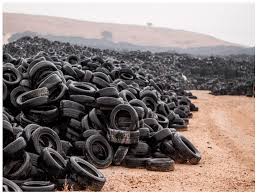The global conversation around sustainability often focuses on reducing waste — but what if recycling could also create new opportunities for growth?
In communities across the country, tire recycling is doing just that: generating jobs, revitalizing local economies, and building a new foundation for industrial innovation.
Companies like Green Tire Group in Grandview, Texas, are leading this transformation, proving that sustainability and economic development can roll forward together.
The Hidden Power of Recycling OTR Tires
Off-the-road (OTR) tires are essential to industries like construction, mining, and agriculture — but they also represent one of the largest and most difficult waste challenges. Each OTR tire can weigh over a ton and is built to resist breakdown under extreme conditions.
Traditionally, disposal meant burying or burning them — both environmentally costly options that offered no long-term value. Today, however, recycling OTR tires has become a high-tech industry in its own right — one that recovers valuable rubber and steel while creating stable, skilled employment in the process.
Local Jobs From Global Waste
Every tire recycling facility, from collection yard to processing plant, supports a range of jobs across multiple skill levels:
- Collection and logistics teams that transport OTR and industrial tires to recycling centers.
- Equipment operators and technicians who handle shredders, separators, and devulcanization systems.
- Material scientists and engineers innovating cleaner, more efficient rubber recovery processes.
- Sales and operations professionals managing rubber mulch, crumb rubber, and tire-derived fuel markets.
At Green Tire Group’s Grandview facility, these roles don’t just keep tires out of landfills — they support families, sustain local businesses, and drive long-term regional growth.
Economic Ripple Effects
Tire recycling facilities stimulate local economies in multiple ways:
- Tax revenue generation from facility operations and product sales.
- Local sourcing for logistics, maintenance, and manufacturing support.
- Secondary industries like construction materials, playground surfacing, and landscaping products that rely on recycled rubber.
- Export opportunities for crumb rubber, steel, and tire-derived fuel (TDF).
In short, tire recycling transforms waste into a supply chain of opportunity — all while reducing environmental strain and landfill use.
The Role of Sustainable Manufacturing
Recycled rubber doesn’t just disappear into new tires — it powers an expanding set of industries. Vulcanized and devulcanized rubber recovered from OTR tires becomes:
- Flooring and mats for factories and gyms
- Road and asphalt reinforcement materials
- Rubber mulch for landscaping and playgrounds
- Tire-derived fuel for industrial energy systems
This continuous flow of material supports sustainable manufacturing jobs that combine environmental responsibility with economic resilience. As more manufacturers adopt recycled rubber products, the demand for recycling expertise — and local facilities like Green Tire Group — continues to rise.
Why Texas Is Becoming a Hub for Green Industry
Texas has long been known for its energy and manufacturing sectors, but it’s also emerging as a leader in circular industry growth. With abundant land, infrastructure, and industrial demand, regions like Johnson County, home to Green Tire Group’s Grandview operation, are ideally positioned to anchor the next wave of green innovation.
The state’s combination of industrial capacity and environmental awareness makes it fertile ground for recycling businesses that add both ecological and economic value.
Workforce Development and Skills for the Future
Tire recycling creates skilled trade jobs that can’t be outsourced — from heavy-equipment operation to materials science and process engineering.
Facilities like Green Tire Group often partner with local trade schools, workforce programs, and community colleges to provide training in:
- Machinery and maintenance
- Environmental compliance
- Industrial safety
- Sustainable materials management
These programs equip workers for a growing job market that blends blue-collar expertise with green-collar innovation.
A Circular Economy That Pays Back Locally
Unlike traditional industries that extract and consume, the circular economy reinvests value into the same communities where materials are collected. Tire recycling is a perfect example:
- Waste from local industries becomes new products for local use.
- Revenue from sales funds further recycling expansion.
- Jobs and innovation remain anchored in the region rather than shipped overseas.
This self-sustaining system ensures that the benefits of recycling don’t just reduce waste — they multiply opportunity.
Conclusion: Building Prosperity from the Ground Up
Tire recycling may start with waste, but it ends with growth — for the environment, the workforce, and the economy.
By reclaiming rubber, steel, and purpose from every tire, companies like Green Tire Group in Grandview, Texas, are proving that sustainability can drive both environmental progress and financial success.
It’s more than recycling — it’s rebuilding, reimagining, and reinvesting in the communities that make progress possible.
Author’s Note
This article was prepared in collaboration with recycling and workforce development specialists at Green Tire Group, headquartered in Grandview, Texas, a U.S. leader in OTR tire recycling, vulcanized rubber recovery, and circular economy job creation.



